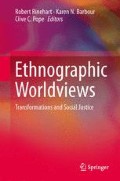Abstract
This proem to the book Ethnographic Worldviews: Transformations and Social Justice serves to locate the collection in contemporary spaces of involved and committed practitioners of the ethnographic craft. While discussing the cutting-edge exemplars within this book, the co-editors present a global picture of the ethnographic craft—and art—that sweeps across a wide range of situated fields and areas of study. Additionally, the co-editors discuss the emphasis on authors from indigenous and southern hemisphere sensibilities, and what this may mean for forward-thinking ethnographic practice.
Access this chapter
Tax calculation will be finalised at checkout
Purchases are for personal use only
Notes
- 1.
Tom Roa wrote the commentary cited in the text and in full below to enhance our understandings of this significant whakatauki, upon which we drew in developing the first CEAD hui and this book. The whakatauki drawn on is:
Kotahi te kōhao o te ngira e kuhuna ai te miro mā te miro, te miro pango, me te miro whero. –Pōtatau Te Wherowhero.
There is but one eye of the needle through which the white thread, the red thread, and the black thread traverse. –Pōtatau Te Wherowhero.
According to Tom Roa,
Whakataukī; whakatauākī; pēpeha; tongikura are pithy, succinct, ancestral sayings which provide lessons from the past to inform our present, and guide our future. They are most often metaphoric, frequently visionary, always purposeful.
Pōtatau Te Wherowhero, the first Māori King, is known to have uttered these words at his inauguration as King in 1858. The visionary foresaw that European technology (the needle) was to play a major role in the future of his people. Using the metaphor of a sewing together of diverse threads, strengthened in that stitching, enhanced by the diversity of colour, his reference was to the various peoples of all colours making their way to Aotearoa/New Zealand, who, when unified, would celebrate their strength, their beauty, their unity in diversity.
A signatory to the Declaration of Independence of 1835, Pōtatau, recognized by many including Governor George Grey as a leading ariki of Māoridom, was not a signatory to the Treaty of Waitangi. He died in 1860, two years after being crowned King, and was succeeded by his son who later became known as King Tāwhiao.
During Tāwhiao’s reign, his Waikato people suffered horrendously with the invasion of their homelands by the Colonial Armed Forces and subsequent Government policies. The Raupatu Settlement as redress for the hara (wrong) has gone a long way to improving the lot of the Waikato people and has been a model not just for other Māori, but for indigenous people the world over. (personal communication, April 16, 2012).
- 2.
The three official languages are te reo Māori, English, and NZ Sign Language.
- 3.
References
Atkinson, P., Coffey, A., Delamont, S., Lofland, J., & Lofland, L. (Eds.). (2007). Handbook of ethnography. Los Angeles: Sage.
Behar, R. (1996). The vulnerable observer: Anthropology that breaks your heart. Boston: Beacon.
Behar, R., & Gordon, D. A. (Eds.). (1995). Women writing culture. Berkeley, CA: University of California Press.
Bruner, E. M. (1993). Introduction: The ethnographic self and the personal self. In P. Benson (Ed.), Anthropology and literature (pp. 1–26). Urbana, IL: University of Illinois Press.
Clifford, J., & Marcus, G. E. (Eds.). (1986). Writing culture. Berkeley, CA: University of California Press.
Ellis, C. (2004). Ethnographic I: A methodological novel about autoethnography. Walnut Creek, CA: AltaMira Press.
Faulkner, S. L. (2007). Concern with craft: Using ars poetica as criteria for reading research poetry. Qualitative Inquiry, 13(2), 218–234.
Goodall, H. L. (2000). Writing the new ethnography. Lanham, MD: AltaMira Press.
Jaschik, S. (2011, November 18). Not feeling the kinship. Inside Higher Ed. http://www.insidehighered.com/news/2011/11/18/anthropologists-debate-role-science#.TsaNNrdSUzx.facebook. Accessed 25 Nov 2011.
Law, J. (2004). After method: Mess in social science research. London: Routledge.
Lee, R. M. (1995). Dangerous fieldwork. Thousand Oaks, CA: Sage.
Percer, L. H. (2002, June). Going beyond the demonstrable range in educational scholarship: Exploring the intersections of poetry and research. The Qualitative Report, 7(2). http://www.nova.edu/ssss/QR/QR7-2/hayespercer.html. Accessed 12 Nov 2011.
Richardson, L. (1997). Fields of play: Constructing an academic life. New Brunswick, NJ: Rutgers University Press.
Richardson, L. (2000). New writing practices in qualitative research. Sociology of Sport Journal, 17, 5–20.
Tamboukou, M., & Ball, S. J. (Eds.). (2003). Dangerous encounters: Genealogy and ethnography. New York: Peter Lang.
Author information
Authors and Affiliations
Corresponding author
Editor information
Editors and Affiliations
Rights and permissions
Copyright information
© 2014 Springer Science+Business Media Dordrecht
About this chapter
Cite this chapter
Rinehart, R.E., Barbour, K.N., Pope, C.C. (2014). Proem: Engaging Contemporary Ethnography Across the Disciplines. In: Rinehart, R., Barbour, K., Pope, C. (eds) Ethnographic Worldviews. Springer, Dordrecht. https://doi.org/10.1007/978-94-007-6916-8_1
Download citation
DOI: https://doi.org/10.1007/978-94-007-6916-8_1
Published:
Publisher Name: Springer, Dordrecht
Print ISBN: 978-94-007-6915-1
Online ISBN: 978-94-007-6916-8
eBook Packages: Humanities, Social Sciences and LawSocial Sciences (R0)

